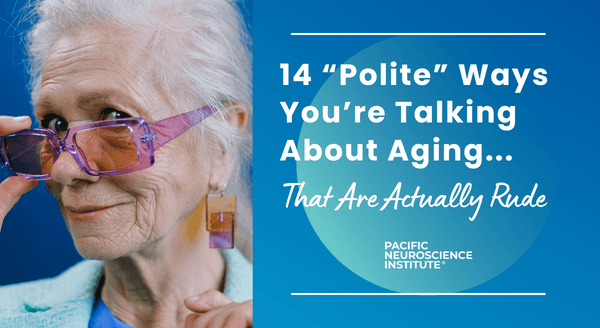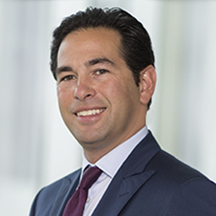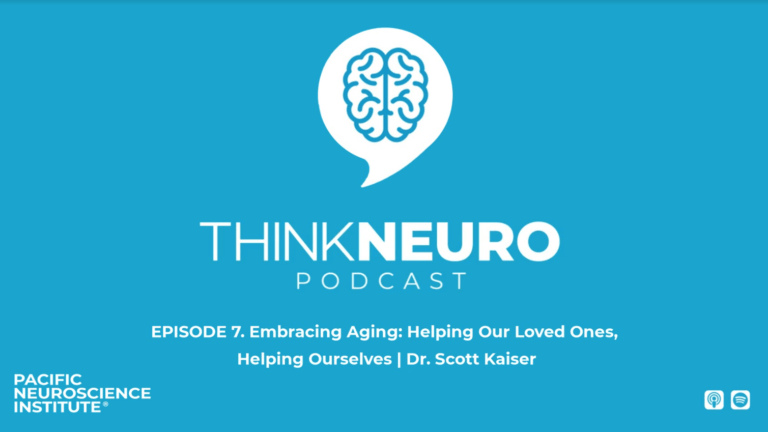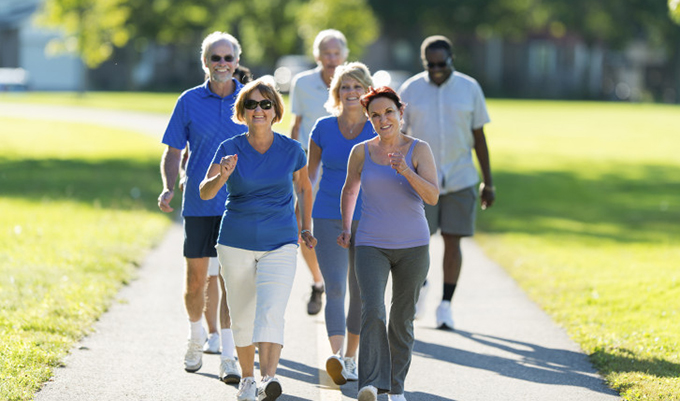

14 “Polite” Ways You’re Talking About Aging That Are Actually Rude
by Guest Author
Director of Geriatric Cognitive Health at Pacific Neuroscience Institute®(PNI®), Scott Kaiser, MD, discusses the “polite” respectful language and attitudes towards aging, combatting ageism and stereotypes, and promoting inclusive and respectful communication for aging experiences.

The strange stigma against getting older
There’s still a strange stigma around age—and we say “strange” because the fact is that we’re all aging from the second we’re born. There’s no escaping aging .
Even though we’re all getting older (right now, this very minute!), somehow we never think we’ll be “old.” As a result, ageism runs rampant in society, not to mention in the workplace, leading to some very unprofessional work habits. These ageist attitudes lead to an us-versus-them mentality (hello, baby boomers and millennials), which just continues the cycle of negativity.
How we talk about aging affects how well we age
“Our perceptions of aging and how we talk about it can directly impact our health and others’ health,” says Scott Kaiser, MD, a geriatrician and director of geriatric cognitive health for the Pacific Neuroscience Institute in Santa Monica, California. He explains how:
- Psychologically: People with positive perceptions of aging are more likely to live longer and thrive mentally.
- Behaviorally: People choose to take better care of a body and mind that they love and plan on keeping for a long time.
- Physically: An optimistic perception of aging leads to less stress and less inflammation in the body, which in turn leads to better heart health and a stronger immune system.
OK, so clearly the words we use to talk about aging are important. But even if you’re respectful of older generations—discussing the topic of aging with care and never using flat-out offensive terms—navigating this topic is still tricky. Just like with mental health etiquette, it’s not enough to know the etiquette rules and etiquette mistakes. You also need to be aware of polite habits most people dislike, including your choice of words. You may not realize it, but some of the “polite” things you’re saying about aging are actually rude.
We asked Dr. Kaiser, and some folks over the age of 50, to share what they wish you wouldn’t say—and what to say instead.

Telling someone they’re attractive for their age
Equating youth with beauty (and aging with ugliness) is one of society’s most prevalent and most damaging stereotypes. It’s a concept Genevieve Chevalier, 58, understands well but still struggles with.
“People used to always tell me that I looked younger than I am, often remarking on my lack of wrinkles. At the time, I appreciated it, but as I got older and those compliments slowed down, it made me feel really bad about myself. I poured tons of money into anti-wrinkle creams and Botox, trying to hold on to the ‘looking younger than I am’ idea,” she says. “It really got me down. These past few years, I’ve stopped all that and made a conscious effort to love myself, wrinkles included. But it’s tough because I feel like it’s an uphill battle against society.”
Say this instead: “You look so beautiful and happy—you’re glowing!” The key is to avoid commenting on their physical appearance at all. If you want to compliment their appearance, praise them for something they can control, like a well-put-together outfit or an intricate hairdo. Complimenting someone’s body is also one of the polite habits restaurant staffers and flight attendants dislike.

Overemphasizing safety concerns
It’s normal to worry about a loved one’s health when participating in different activities, but age has less to do with the level of risk than other factors, including pre-existing health conditions and fitness level, says Dr. Kaiser. Questioning someone’s abilities based only on their age is not just inaccurate but could actually make them fearful of doing things, causing their health to worsen over time. “We want to be encouraging people to continue living life to their full potential throughout their lifespan [and] empower people to continue doing what they love,” he says.
Surfing has always been Jack Abrams’s first love, and he is indeed still doing it at 65 years old—with his doctor’s approval, he adds. “The number of times I’ve had people tell me to stop kitesurfing because ‘it’s too risky at your age’ is mind-boggling,” he says. “I know they’re just saying it because they love me and they don’t want me getting hurt or dying, but you guys, this is what I live for!”
Say this instead: “You have your life jacket and sunscreen? Enjoy the waves!” You can express concern about someone’s safety and well-being without ever mentioning their age, says Dr. Kaiser.

Dissing your aging body
How we talk about ourselves in relation to aging is just as important as how we talk about others. So telling someone you can’t do something because you’re a certain age reinforces the belief that people have to give up things they love simply because they’re getting older. Worse, it may give them an insecurity they didn’t already have, making them worry that others think they’re too old to, say, wear a cute short skirt.
“A good friend of mine said she was retiring all her crop tops because she felt that now that she’s past 30, it’s time she stopped ‘dressing like a teenager,'” says Chevalier. “I thought she looked great, and it made me wonder if she was judging some of my trendier fashion choices.”
Say this instead: “Who cares about fashion rules? I wear what makes me feel good!” Don’t let this self-depreciating behavior be just one more mistake you make while shopping. Forget any imposed age restrictions and pick your clothes and activities based on what you enjoy.

Using the phrase “the elderly”
Most people see the phrase the elderly as outdated and disrespectful, says Dr. Kaiser. For starters, people over a certain age aren’t a monolith—they’re individuals who often share nothing but a birth year. And the word “elderly” is generally negatively associated with frailty and illness.
“What do I prefer to be called? My name works fine,” says Chevalier. “If you want to group me by my birth date, then you can say I’m a Sagittarius.”
Say this instead: The terms older adults and seniors are preferred when speaking of people over 60 years old. These terms are more inclusive and respectful, and they do not have the same negative connotations as the term elderly. And if you do make a mistake? It’s not the end of the world—just apologize.

Offering unsolicited help
Anticipating a loved one’s need and offering help is one of the nicest acts of kindness—who doesn’t love an extra helping hand sometimes? “The problem isn’t the offer to help,” says Dr. Kaiser. “It’s the assumption that the person can’t navigate a normal life thing due to their age.”
He adds that your belief that an older person can’t do something may lead them to believe they’re not capable—even if they are. The best tactic in these situations is to ask if they need help and then empower them to continue to do the task in some way rather than take it over for them, he says.
Say this instead: “Would you like help going up the stairs? Would you prefer to take my arm or use the elevator?” Asking what a person needs, rather than assuming, makes all the difference, Dr. Kaiser says.

Praising someone’s independence
On the other end of the spectrum from the constant unasked-for “helping” is a push for older adults to stay independent as long as possible. “People see independence as praise for their older loved ones, but in reality, it often means isolation,” explains Dr. Kaiser. “People of all ages need support, help and others checking in on them.”
Maria Montenero, 60, can relate. “My kids were shocked when I wanted to move into a retirement community because I am so independent,” she says. “And I can definitely still take care of myself. But I’m tired of being lonely! I’ve come to depend on my friends here, and that’s the best kind of dependence.”
Some older adults do relish the freedom of living solo, and in those cases, the key is to set up a support structure so they are empowered to take care of themselves but are still being cared for and checked on, Dr. Kaiser says.
Say this instead: “How are you doing living on your own? What can I do to support you better?”

Cracking old-age jokes
People cracking jokes about their own aging can be funny (and a good way to cope with the ups and downs of getting older). But making jokes about someone else’s age or about older people in general isn’t fun or funny.
“It’s still considered socially acceptable to make fun of someone’s age, but people often don’t realize that when they’re making negative jokes at the expense of ‘old’ people, they’re insulting their future selves as well,” says Dr. Kaiser. “And I gotta say it: The jokes about getting old are … getting old.”
Besides, these jokes make it seem like we should be ashamed of our age. Instead, Aging is something to feel good about.
Say this instead: “Old age is a heck of a lot better than the alternative.” Take a page from this one-liner and pick a joke that is funny but not negative about aging.

Telling someone they look great for their age
This is an incredibly common compliment, but upon closer examination isn’t really much of a compliment. By telling someone they look great for their age, you’re implying that someone of that age should look “bad” or that the standard for looking good gets lower as you get older.
Say this instead: “You look great!” Just drop the “for your age” bit. Looking happy, healthy, joyful, compassionate, fun and beautiful aren’t dependent on age at all.

Brushing off memory lapses as signs of old age
We get it: You’re trying to be polite in the face of a forgotten birthday, name, meeting or get-together. But by brushing off the slip as a case of aging memory, you may be inadvertently making the person feel bad about herself. “Don’t assume that just because someone is getting older they are cognitively declining,” says Dr. Kaiser, adding that it’s normal for people of all ages to forget things sometimes. Besides, not all mental abilities decline as we get older. “There are some aspects of cognition, like pattern recognition, that improve with age,” he says.
That said, if you feel like your loved one might be suffering from dementia or cognitive decline, it’s important to have that conversation and get them medical help. But cognitive impairment isn’t inevitable simply because your loved one is aging, says Dr. Kaiser.
Say this instead: “Don’t feel bad about forgetting my birthday. Mistakes happen!”

Asking for their anti-aging secret
You might think you’re being polite by asking someone for their secret to staying young—after all, it implies they look good for their age. But now you know that implication is a big no-no.
Don’t compliment others by telling them they are aging backward, and don’t buy into the anti-aging propaganda yourself. And yes, it’s just that: propaganda. “There’s no such thing as ‘anti-aging’ or ‘aging backward.’ That’s just marketing speak designed to make people think they can stop aging by selling them more products,” says Dr. Kaiser. “We’re all aging, and that’s a great thing!”
It’s a stance Abrams takes as well. “I’ve often wondered why anyone would want to be ‘anti-aging.’ That either means they are pro denial or pro death,” says Abrams. “Getting older is a privilege, and not everyone gets to.”
Say this instead: Instead of asking someone for their secret tips on how to look younger, ask them to share some of their life-earned wisdom. You might ask, “What is your top tip for finding joy?”

Calling someone young at heart
Describing someone as young at heart implies that their body is old and frail. And again, that equates youth with positive attributes and old age with negative ones. What people typically mean with this so-called compliment is that you seem joyful, happy, exuberant or active—all qualities that aren’t unique to youth.
You can’t choose to age, but you can choose how you experience aging, and choosing happiness should be encouraged and recognized.
Say this instead: “I love your joy and zest for life!”

Automatically speaking loudly
Many people instinctively raise their voices when speaking to older adults, assuming the raised volume will help them engage in the conversation (a cellphone etiquette mistake too).
Yet only 14% of adults up to age 60 and 33% of those in their 60s and 70s have hearing loss. So the majority of people you talk to will be able to hear you just fine, and you shouldn’t assume that you need to yell. In fact, yelling at people can feel very jarring and upsetting, says Dr. Kaiser. Even for people with some hearing loss, yelling doesn’t feel helpful, and if they’re using hearing aids, yelling can even be painful.
There are times when yelling is appropriate, like at a basketball game. But beyond that, you don’t need to shout.
Say this instead: “Can you hear me OK?” is perfectly acceptable in situations in which someone doesn’t seem to understand what you’re saying. But ask it at a normal volume. When starting a conversation with an older adult, speak in a normal voice. If the person asks you to speak up, then go ahead.

Telling someone they’re not a good “cultural fit” for your company
Companies go out of their way to seem polite when turning down job applicants. But while this phrase seems more polite than the alternative (“We don’t want you working here”), it’s also a common workplace euphemism used to exclude someone from employment based on their age, race or gender—all legally protected classes.
Even though your age is one of the first things a job interviewer notices, there’s a reason it’s illegal to discriminate based on age: It’s not a good predictor of what kind of worker a person will be. (Your age also shouldn’t be one of your job interview questions.)
“I see this a lot in the tech industry, which, by the way, I work in,” says Abrams. “People think only younger folks will understand how to use technology or will have innovative ideas. The irony, of course, is that it’s us old guys who invented the systems they’re using!”
Say this instead: “Why don’t you come in and meet the team?” There are some personalities that just don’t jive, and it’s fair to take that into consideration, but make sure you’re basing that decision on how they interact with the group rather than assumptions about their age.

Putting your age in your email signature
There’s an “age-liberation” movement happening that encourages people to include their age along with their name and preferred pronouns. You’ll see this on name tags and in email signatures as a new rule of email etiquette. But while the intention is polite, it’s still focusing on the wrong thing, says Dr. Kaiser.
“It shouldn’t matter what the actual number of someone’s age is in determining how we treat them,” he says. For instance, knowing someone’s pronouns will change how you address them, but knowing someone’s age gives you no extra relevant information. “We want to be treating 80-year-olds the same way we do 50-year-olds and 20-year-olds,” he says.
Say this instead: Nothing. Don’t ask people’s age, and don’t base your treatment of people on their age. If you want to volunteer your own age, that’s up to you.
Sources:
- Scott Kaiser, MD, geriatrician and director of geriatric cognitive health for the Pacific Neuroscience Institute in Santa Monica
- Genevieve Chevalier, 58
- Jack Abrams, 65
- Maria Montenero, 60
Article adapted from Readers Digest.
Healthy Aging at Pacific Neuroscience Institute
At the Pacific Brain Health Center, our providers aim to help you and your loved ones enjoy greater longevity by taking a proactive approach to improving overall health, identifying cognitive changes, and intervening to optimize cognitive function and maximize quality of life. We prioritize the adoption of healthy aging approaches during both our initial brain health assessment and at follow-up visits through a combination of medical optimization and healthy brain lifestyle recommendations. Patients experience positive results with our integrative program that promotes well-being and vitality across the lifespan.
About Scott Kaiser, MD

Scott Kaiser, MD, a board-certified family physician and geriatrician, is the Director of Geriatric Cognitive Health and provides specialty geriatric medical consultations at the Pacific Brain Health Center. Focused on the needs of older patients, he works with his colleagues to provide an integrated and holistic approach to their cognitive challenges. With this “whole person” approach, Dr. Kaiser works to connect patients and their families with a broad range of resources to support their overall health and well-being.
Related Articles
Last updated: July 11th, 2025




